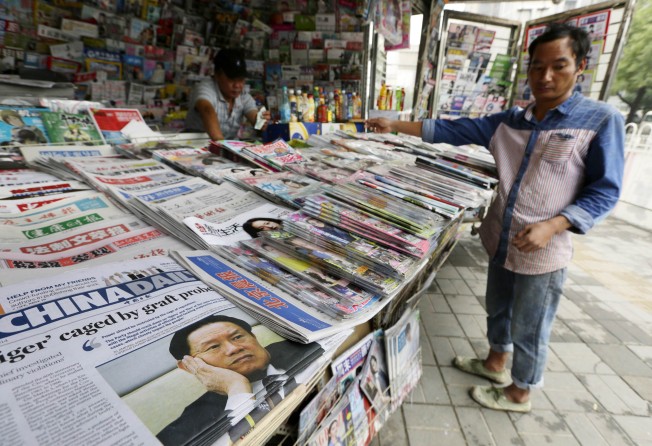Declarations of loyalty a feature of China's dog-eat-dog politics
Deng Yuwen and Jonathan Sullivan note the obligatory denouncements after Zhou Yongkang's fall

Soon after the official announcement that former security tsar Zhou Yongkang was under investigation, various provinces, cities and departments began lining up to declare their support for the wisdom and rectitude of Xi Jinping's decision. Among them were Zhou's first and last places of work - the public security system, Sichuan province and China National Petroleum Corporation. They made sure to declare their support for Xi and distance themselves from their disgraced former patron.
Publicly declaiming one's loyalties is a special feature of communist Chinese politics. Politicians in other countries are also obliged at some time or other to pay lip service to important policies or events but the regularity of such declarations in China has made it part of the political cultural tradition.
Possibly only North Korea can rival China in this regard.
Although the mass campaigns of criticism and self-declarations were buried with Mao Zedong, in the reform era, when an important political figure falls or is involved in a big scandal, the entire party ranks and bureaucracy have to declare their position. And when the fallen official in question is related to a specific unit or person, his successor should lead the way in pronouncing their loyalties.
What can explain this passion for showing one's colours? For those at the top, it goes beyond wanting subordinates to show support. It is about submission to authority and ensuring that the party maintains coherence and consistency in political positions.
From the perspective of lower-level officials, showing one's colours is not simply about trying to curry favour. It is a demonstration of subservience, but the crucial thing is that it draws a boundary and creates distance from the target of criticism.
There are usually three stages to Chinese self-declarations. The first is to praise the wisdom and timeliness of the central authorities' decision, followed by championing the policy and making practical moves to demonstrate acceptance of the party's commands.
Take the Supreme People's Court's recent self-declaration. First, it said that the central party's decision to investigate Zhou fully reflected the strong and powerful leadership of party secretary Xi, and that it had the support and endorsement of the party membership, the army and the masses.
Next it emphasised that its thinking, strategy and actions had been completely consistent under Xi's leadership.
Finally, it demanded that lessons be learned from Zhou's transgressions, earnestly promoting the strengthening of party discipline and state education in order to ward off the scourge of corruption.
The pronouncements of other departments, provinces and cities were similar.
The backdrop to these demonstrations of loyalty is the party's philosophy of struggle within the political arena, and the dog-eat-dog mentality of political competition within the party. Organised on Leninist lines, the Communist Party operates under the principle of democratic centralism, which requires that individuals submit to the organisation, subordinates obey their superiors and the party ranks obey the central leadership.
Consequently, the central party, and particularly the elite leadership, has a monopoly on the right to decide what "the truth" is.
The power and temptation that this high degree of centralisation promises has led to intense competition for leadership positions at all levels, producing cutthroat battles of incredible bitterness. The losers of these political struggles are subjected to ruthless humiliation and criticism by the entire party. Party leaders use these purges to warn potential rivals and other cadres to stand on the right side of the line or face the consequences.
The concentration of political discipline, reinforced by the philosophy of struggle and a winner-takes-all mentality, is responsible for this culture of showing one's colours. In short, it is the product of an authoritarian political organisation.
Of course, the religious fervour and ubiquitous fear and trepidation of the Mao era are lacking today. And it has all become more theatrical and ceremonial, with the recognition, and resignation, that such affectations are an obligatory charade, much of it for public consumption.
Although this might count as a kind of progress, the culture of self-declaration means no one is ever completely safe, not even the top leadership. Thus, officials are compelled to inhabit a world that is inherently hostile and could turn on them at any minute. It is little wonder that officials are so assiduous in building up the finances and networks they need to protect themselves. Without systematic political change, the culture of declaration and many other symptoms will be impossible to cure.
Deng Yuwen is a Beijing-based political analyst. Jonathan Sullivan is associate professor and deputy director of the China Policy Institute at the University of Nottingham